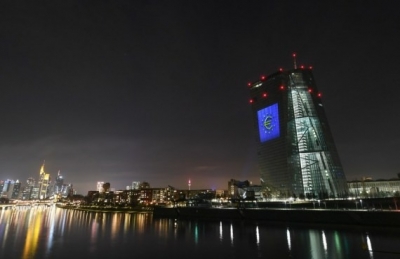Euro nearing five-year low stoking recession fears
By IANS | Published: April 30, 2022 01:27 AM2022-04-30T01:27:03+5:302022-04-30T01:40:07+5:30
Rome, April 30 The euro has continued to weaken against $, approaching its lowest level in five years, ...

Euro nearing five-year low stoking recession fears
Rome, April 30 The euro has continued to weaken against $, approaching its lowest level in five years, mainly due to the crisis in Ukraine and the sluggish economic growth in Europe.
At the close of trading on Friday, the euro dropped to as low as $1.0455, its weakest since May 2017, when one euro was worth $1.0338, according to the currency exchange site xe.com.
On March 31, one euro was worth $1.1162, and a year ago the respective figure was $1.2141, more than 16 per cent higher than Friday's close, Xinhua news agency reported.
"The euro is within reach of five-year lows and it seems increasingly likely it will break through that barrier and approach dollar-euro parity," Lee Hardman, a currency economist with MUFG Bank in London, told Xinhua.
Parity between the two currencies is unusual. Currency markets have not valued the $ equal to or more than the euro since 2002.
"When it comes to currency markets these psychological barriers can be significant," Viraj Patel, a foreign exchange and macro strategist with London's Vanda Research, told Xinhua.
"From a pure economic standpoint, the difference between 1.001 US dollar per euro and 0.999 dollars per euro is small. But psychologically, it's very important."
Hardman, Patel and other analysts attribute the euro's weakness to ripple effects from the conflict between Russia and Ukraine, which is impacting Europe more than other parts of the world. The conflict is causing rising energy prices and trade disruptions, and is a significant drag on countries' post-pandemic economic recovery.
Economists see a growing risk of recession back-to-back quarters of negative economic growth in Europe later this year. Some European economies already reported negative growth in the first quarter of 2022 after strong positive growth in 2021.
Hardman said a near-term recovery for the euro was unlikely, especially if the Russia-Ukraine conflict continues, though he said he thought that over a two-to-three-year span the euro would probably remain stronger than the $.
"Right now, we are seeing a greater divergence between the impacts (of the conflict) on the United States and Europe," he added.
"The conflict has been a greater shock in Europe and currency markets are pricing that into their calculations."
According to Patel, the weaker currency would erode the European Union's normal positive trade balance by making exports less valuable and increasing the price of imported goods sold in $ or other currencies, sparking inflation and reducing consumer confidence. Rising energy prices are a major factor in those calculations.
That already happened in February, according to European Union data released last week.
Countries that use the euro recorded a trade deficit of 7.60 billion euros ($7.95 billion) in February, compared to a surplus of 23.50 billion euros in 2021.
The euro is used in 19 of the 27 European Union member states.
Disclaimer: This post has been auto-published from an agency feed without any modifications to the text and has not been reviewed by an editor
Open in app